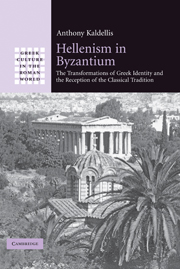 Hellenism in Byzantium
Hellenism in Byzantium Book contents
- Frontmatter
- Contents
- Preface
- Introduction
- PART I GREEKS, ROMANS, AND CHRISTIANS IN LATE ANTIQUITY
- PART II HELLENIC REVIVALS IN BYZANTIUM
- 4 Michael Psellos and the instauration of philosophy
- 5 The Third Sophistic: the performance of Hellenism under the Komnenoi
- 6 Imperial failure and the emergence of national Hellenism
- General conclusions
- Bibliography
- Index
4 - Michael Psellos and the instauration of philosophy
Published online by Cambridge University Press: 24 December 2009
- Frontmatter
- Contents
- Preface
- Introduction
- PART I GREEKS, ROMANS, AND CHRISTIANS IN LATE ANTIQUITY
- PART II HELLENIC REVIVALS IN BYZANTIUM
- 4 Michael Psellos and the instauration of philosophy
- 5 The Third Sophistic: the performance of Hellenism under the Komnenoi
- 6 Imperial failure and the emergence of national Hellenism
- General conclusions
- Bibliography
- Index
Summary
Where to start with Psellos? The word “unique” is often used lightly by historians but in this case it is no idle epithet. Psellos' radical philosophical proposals, his manifold and innovative writings on all subjects, his prestigious and historically impactive career at the court, his importance as a source for the eleventh century, and his decisive influence on Byzantine intellectual life, make him the most amazing figure in Byzantine history. He cannot be “explained,” at least not yet. Psellos appeared almost out of nowhere and very self-consciously revolutionized intellectual life without regard for our categories and narratives. He is especially important for the revival of Byzantine Hellenism, which sprung from him like Athena from the head of Zeus, disrupting any notion of a gradual development. In fact, it took his intellectual and literary heirs long to absorb his thought, and few would go as far as he did in replacing the Christian component of Byzantine culture with Greek philosophical alternatives.
Psellos cannot easily be “summarized,” even if only under one aspect, as will be attempted here. To begin with, we lack the basic groundwork. There is still no biography or secure chronology for his manifold writings. Though most of them have been published, few have received careful individual study. This makes matters difficult because depending on the audience, circumstance, and philosophical or political goals of each work, Psellos has something different to say, often modulating or entirely contradicting what he says elsewhere.
- Type
- Chapter
- Information
- Hellenism in ByzantiumThe Transformations of Greek Identity and the Reception of the Classical Tradition, pp. 191 - 224Publisher: Cambridge University PressPrint publication year: 2008
